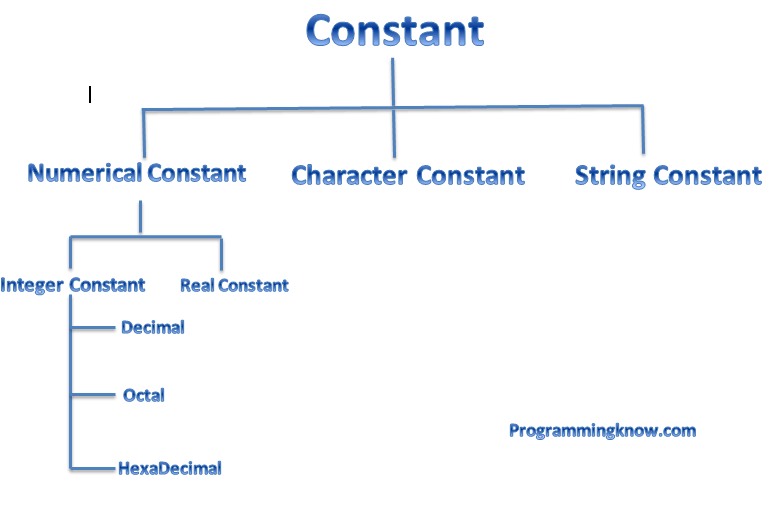C++ Identifier and constant
Identifiers refers to the name of variables, functions, array, classes etc created by The programmer. They are the fundamental requirement of any language. Each language has its own rules for the naming these identifiers.
The following rules are common to both c and the c++
1. The name cannot be start with a digit.
2. only alphabet character, digits and underscore are permitted.
3. Uppercase and lowercase letters are distinct.
4. A declare keyword cannot be used as a varibale name.
Some valid Identifiers examples are
number Amount_pay reg1 _data AVERAGE
Some Invalid Identifiers examples are-
6number int reg# 4data AVERAGE no
| auto |
else |
new |
switch |
| operator |
temple |
break |
enum |
| private |
this |
case |
extern |
| throws |
catch |
float |
public |
| try |
char |
for |
register |
| typedef |
class |
typedef |
friend |
| return |
union |
const |
goto |
| short |
unsigned |
continue |
if |
| signed |
virtual |
default |
inline |
| sizeof |
int |
delete |
static |
| volatile |
do |
long |
struct |

Numeric Constant in C++
The Numeric constant consist of numerical digits. They may be without decimal point or may have decimal point(.). These are number of rules for defining numeric constants-
1. Numeric constant should have at least one digit.
2.There should be no comma or space is allow within the numeric constant for defining.
3. Numeric constant may be positive or negative but default sign of numeric constant is always be positive.
Integers Constant in C++
There are three types of integer constant based on numbers systems such (decimal, octal, hexadecimal) so here all are integer constants or integer types constants but based on number system
Decimal constants- 0,1,2,3,4,5,6,7,8,9 (base 10)
octal constants- 0,1,2,3,4,5,6,7 (base 8)
Hexadecimal constants 0,1,2,3,4,5,6,7,8,9,A,B,C,D,E,F,a,b,c,d,e,f (base 16)
lets us see some valid decimal integers constants are-
here are some invalid decimal integers constants are in the below example-
|
Invalid
|
Remarks |
|
8.5
|
illegal character(.) |
|
67 9
|
No black space allowed |
|
86,55
|
comma not allowed |
|
05546
|
first digit can not be zero |
|
809#55
|
Illegal character (#) |
let us see some valid octal integers constants and take example, first digit must be 0.
let us see and take example of some valid Hexadecimal integers constant, first two characters should be 0X or 0x. some examples are
|
0X89
0x6653
0X98FBC
0xAAABM
0Xabm
|
Real(Floating point) Constant in C++
The Floating point constant are numeric number constant with decimal point. Here take example of some floating point constants –
|
0.9
3.459
6655.8
100.6
5.2
99.33
|
Character Constant in C++
The character constant is the single character that is enclosed with in the single quotes. here are some valid character constants are-
|
Invalid
|
Remarks |
|
‘lion’
|
There should be only one character within quotes |
|
“N”
|
Double quotes are not allowed |
|
X
|
single quotes missing |
|
”
|
There is no character between single quotes |
Note: Every character has unique integer value. so every associated value or integer value is machine code such as ASCII(American standard code for information interchange). its depend on machine if machine using ASCII then A character represent by 65
Here are Some ASCII values are-
|
A-Z
|
ASCI value(65-90) |
|
a-z
|
ASCI value(97-122) |
|
0-9
|
ASCI value(48-57) |
|
;
|
ASCI value(59) |
String Constant in C++
A string Constant is a group of characters enclosed within double quotes(“”). At the end of string the complier automatically placed null character (‘\0’).
Here are some examples of String constants-
|
“Saraswat”
“Nitish”
“897”
“5”
” “
“,”
|
Symbolic Constant in C++
if in program we want to use constant as several times, we can given it a name. such as if we use 3.1414587 at many times in a program. We can give it a name PI, and uses it name PI . where we need instead of writing the constant value anywhere. These types of constant are known as Symbolic constant.
|
PI 3.141567
name “Nitish”
CH ‘c’
|